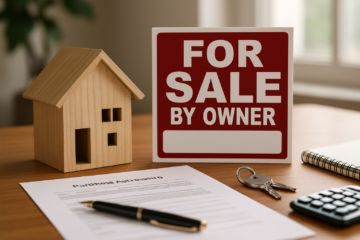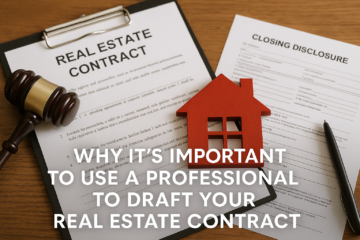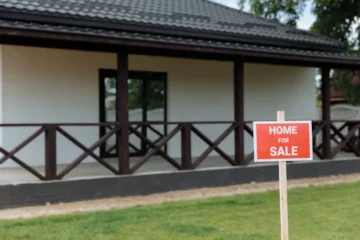Selling your home by yourself, known as ‘For Sale By Owner’ (FSBO), can be an exciting but challenging endeavor. Whether you are in Maryland or Virginia, navigating this path without the guidance of a real estate agent involves specific pitfalls you must steer clear of to ensure a successful sale. Here are some common mistakes you want to avoid.
1. Setting an Unrealistic Price
Pricing is critical in real estate. Many FSBO sellers make the mistake of setting their price too high, which can turn off potential buyers. It’s essential to research comparable homes in your area and perhaps even hire an appraiser to set a realistic price. If you price too low, you risk leaving money on the table. A thorough analysis of the market will ensure you strike the right balance. Maryland’s real estate market, currently favoring sellers, necessitates smart pricing that reflects demand without scaring off prospective buyers. This is crucial, as homes priced correctly tend to receive 40% more interest, leading to quicker sales and potentially multiple offers How to Sell a House By Owner in Maryland.
Understanding the importance of accurate pricing involves more than just doing some market comparisons. It’s about adjusting your price based on unique factors that might affect the desirability of your listing, such as the condition of your neighborhood and proximity to amenities. For instance, homes in cities like Bethesda can be priced 10% higher due to demand and limited availability. Consider these aspects carefully before deciding your home’s listing price.
2. Neglecting Curb Appeal
First impressions matter. If your home doesn’t look appealing from the outside, potential buyers might not even step inside. Investing time in landscaping, fresh paint, and minor exterior fixes can make a significant difference. A well-maintained exterior sets your home apart from others and can increase its perceived value by as much as 10%.
Don’t overlook the small details that enhance your home’s curb appeal. Flower beds, a clean driveway, and a freshly painted front door can welcome visitors warmly and invite them to explore further. More than 70% of buyers sort through listings online before deciding to walk through the door, so ensure your home’s exterior is picture-perfect for these first digital impressions.
3. Ignoring Necessary Repairs
Minor repairs can become deal breakers. Addressing issues like leaky faucets, faulty wiring, or broken tiles ahead of time prevents potential challenges during home inspections. Catching these issues early means fewer hiccups down the line and prevents re-negotiations that could lead to lower sale prices or, worse, lost deals.
Invest in a pre-listing inspection to uncover and resolve problems before potential buyers do. Fixing small issues not only adds value to your property but also builds buyer confidence. Simple repairs can make a large impact on the buyer’s perception of the home’s overall condition.
4. Skimping on Marketing Efforts
With no real estate agent to market your home, the responsibility falls on you. Utilize online listings, social media, and local advertisements to reach a broader audience and attract potential buyers. List on popular sites like Zillow, Trulia, and Redfin to maximize exposure. Additionally, professional photography can make your listing stand out — homes with high-quality photos sell 32% faster.
Don’t underestimate the power of visual marketing. Consider hosting virtual tours, which have become increasingly popular and can increase interest among remote buyers. Engaging marketing materials can be shared broadly across platforms, reaching an audience that stretches beyond local boundaries.
5. Underestimating the Legal Requirements
Real estate transactions involve complex legalities. Ensure that you are familiar with contracts, disclosures, and other legal requirements to avoid future complications. Enlisting a real estate attorney can clarify the process, ensuring all legal obligations are met, thus minimizing risks of post-sale disputes. Involving an attorney helps safeguard your financial interests and offers peace of mind.
6. Not Prioritizing Proper Staging
Staging your home can highlight its best features and help buyers visualize living there. Consider hiring a professional stager or invest in a few key pieces to create an inviting environment. This strategy can increase your home’s appeal, as well-staged homes often sell faster and for higher prices. Remember, the goal is to create a space that encourages buyers to invest emotionally in your home.
Focus on decluttering and depersonalizing spaces, allowing potential buyers to envision their belongings in your space. Thoughtful staging showcases space utilization, making rooms appear larger and more functional. These efforts can transform your property into a welcoming retreat that convinces prospective buyers of its value.
7. Overlooking Negotiation Skills
Negotiating is an art that requires practice. Be prepared to handle offers and counteroffers effectively to reach a consensus that works for both parties. Understanding your bottom line beforehand will guide you in decision-making and prevent emotion-driven choices that might compromise your financial outcomes. Effective negotiation helps achieve a balance between appealing to buyers and meeting your sale expectations.
It’s important to remain flexible during negotiations. While steadfastness on key terms protects your interests, consider that reasonable compromises could expedite the sale process and result in a win-win situation. Counsel from seasoned negotiators or legal advisors can provide guidance, ensuring you remain strategic and fair.
8. Failing to Qualify Potential Buyers
Time is precious. Ensure that anyone interested in your home is pre-approved for a mortgage to prevent wasting time on non-serious buyers and streamline the selling process. Pre-qualified buyers are more likely to close a deal efficiently, reducing the chances of last-minute surprises. Confirming financial readiness saves time and prevents the emotional rollercoaster of failed negotiations.




0 Comments